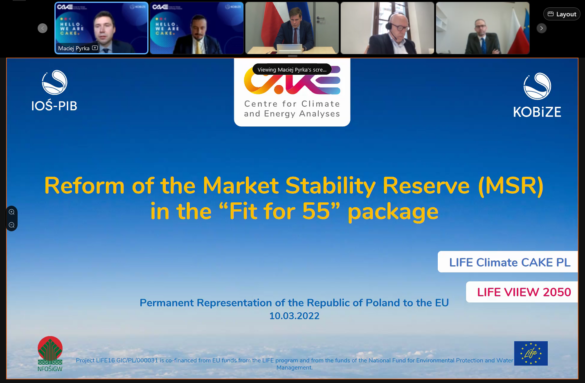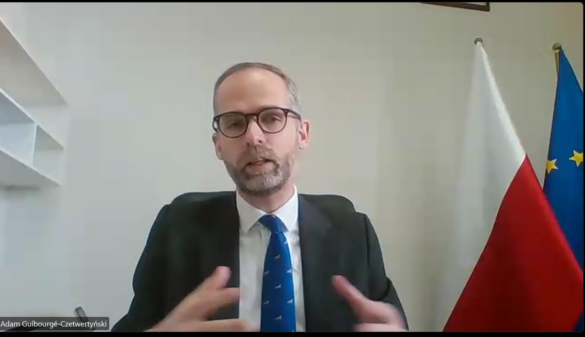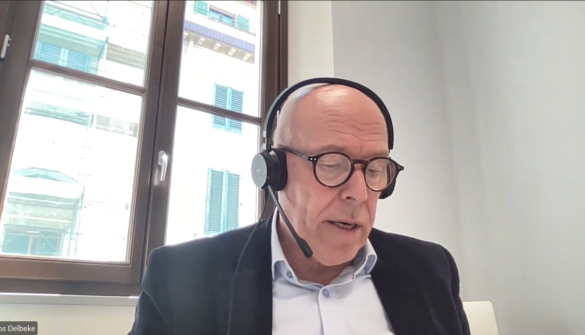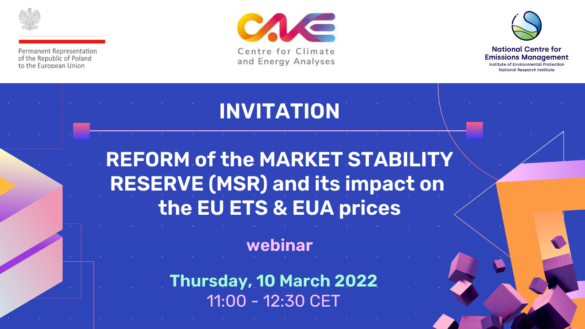CAKE webinar: The Reform of the MSR and its impact on the EU ETS & EUA prices
On the 10th of March 2022 the joint Permanent Representation of Poland to the EU with CAKE/KOBiZE co-organized the webinar “Reform of the Market Stability Reserve (MSR) and its impact on the EU ETS & EUA prices”.
We are honoured that Vice Ambasador Mr. Arkadiusz Pluciński Permanent Representation of Poland to the EU and Deputy Minister Mr. Adam Guibourgé-Czetwertyński Ministerstwo Klimatu i Środowiska took part in the event. We would like to express our gratitude for excellence moderation at the event to Ms. Federica Di Sario from Carbon Pulse and all the panelist for their inspiring thoughts during the discussion.

At the conference Robert Jeszke – Head of CAKE/ KOBiZE underlined that EU is currently facing an unprecedented geopolitical and critical situation and this raises questions about the form of the EU Green Deal and Fit for 55 package and entire energy transformation of the EU. Robert Jeszke stressed that EUA price increases will be driven by the still strong fundamentals of this market resulting from the adopted climate goals & future supply tightening. But, it is necessary to pay attention to a number of technical elements of EU ETS to be changed as part of Fit for 55 package. In this respect he pointed out that MSR was designed to absorb any surplus allowances on the market caused by emission reduction. Now, with higher 24% intake rate the effect would be stronger & would have a big impact on the availability of allowances on the market & put more pressure on the EUA prices. The withdrawal from Russian natural gas is a real challenge for Europe, therefore the reflection on the shape of the EU ETS reform should be considered holistically, taking into account Europe’s energy and economic security.
Maciej Pyrka our modelling expert from CAKE/ KOBiZE gave the introductory presentation “Reform of the Market Stability Reserve (MSR) in the “Fit for 55” package showing how we could consider – in the context of MSR revision – different MSR design options to meet the EU 2030 reduction target. He pointed out some main results of the CAKE MSR analysis:
- Extension of the current 24% intake rate until 2030 would result in a much faster tightening of supply by increasing EUA transfers to MSR and accelerating emissions reduction by 2025;
- In all MSR scenarios the EU meets the 2030 target (61% reduction in 2030 vs. 2005);
- Implementation of the „Fit for 55” package as proposed by the European Commission would increase EUA price to approx. EUR 130 in 2030 (medium price scenario);
- The increase in the EUA price in 2030 has serious effects which are reflected in the increase in the costs of energy generation from fossil fuels and the increase in production prices in the energy and emission intensive sectors in the EU.
?Presentation:
 Prezentacja_LIFE_Climate_CAKE-_MSR_10_03_2022_ENG.pdf (1.2 MiB, 456 hits)
Prezentacja_LIFE_Climate_CAKE-_MSR_10_03_2022_ENG.pdf (1.2 MiB, 456 hits)
?Full CAKE MSR report:
 Reform of the market stability reserve (MSR) in the “Fit for 55” package (2.3 MiB, 1,055 hits)
Reform of the market stability reserve (MSR) in the “Fit for 55” package (2.3 MiB, 1,055 hits)
During the panel discussion which was focused among others on of how the future MSR could and should be designed:
?Deputy Minister Adam Guibourgé-Czetwertyński (Ministry of Climate and Environment) stressed that the industry has a difficult situation – they do not know what to do because the market is highly volatile. Investment planning takes years. Marginal reduction cost may not reflect the market price, which may be artificially inflated by speculation. He also pointed that there is a need for a proper functioning Art. 29a EU ETS directive mechanism as a market safeguard tool. It needs to be improved by clarify the wording, automatic release and should be more responsive. As an inspiration we should look in the UK ETS and the Commission proposal for ETS2 for building & transport.
the market is highly volatile. Investment planning takes years. Marginal reduction cost may not reflect the market price, which may be artificially inflated by speculation. He also pointed that there is a need for a proper functioning Art. 29a EU ETS directive mechanism as a market safeguard tool. It needs to be improved by clarify the wording, automatic release and should be more responsive. As an inspiration we should look in the UK ETS and the Commission proposal for ETS2 for building & transport.
?Bernadett Papp (Vertis Environmental Finance) stressed that there are a lot of uncertainty at the CO2 market. Key issue for EUA’s are the length of the war & economy consequences for EU. If the war is continue prices could drop even more deeply. On the other hand EUA could rebound as quickly as in March 2020 in Covid panic. During the discussion on “price settings” or “price corridor” ideas, she pointed that EUA price should be market-based and reflects supply & demand. Price setting in price corridor could be very difficult because there are different marginal costs for different sectors and countries.
the CO2 market. Key issue for EUA’s are the length of the war & economy consequences for EU. If the war is continue prices could drop even more deeply. On the other hand EUA could rebound as quickly as in March 2020 in Covid panic. During the discussion on “price settings” or “price corridor” ideas, she pointed that EUA price should be market-based and reflects supply & demand. Price setting in price corridor could be very difficult because there are different marginal costs for different sectors and countries.
?Jos Delbeke (European University Institute/ European University Institute, EIB Chair on Climate Change Policy and International Carbon Markets) also supported this point of view  stressing that the MSR design should be kept as simple as possible. It is true, that the 24% intake rate forces more emissions reductions now rather than later but it’s a political decision – if we want it sooner or later. Price corridor would be problematic as politicians preferences & goals are different. He also put attention on the MSR decision wording and pointed out that “invalidating” EUA allowances in MSR doesn’t mean that they are “cancelled” and disappearing – they are parked (“sleeping”) in a special account in the EU ETS registry.
stressing that the MSR design should be kept as simple as possible. It is true, that the 24% intake rate forces more emissions reductions now rather than later but it’s a political decision – if we want it sooner or later. Price corridor would be problematic as politicians preferences & goals are different. He also put attention on the MSR decision wording and pointed out that “invalidating” EUA allowances in MSR doesn’t mean that they are “cancelled” and disappearing – they are parked (“sleeping”) in a special account in the EU ETS registry.
We appreciate the inspiring discussion, thank all the panelist and look forward for future events.


 Reset ustawień
Reset ustawień Kontrast
Kontrast Widok
Widok Czytelność
Czytelność Czcionka
Czcionka Znaki
Znaki Interlinia
Interlinia Słowa
Słowa Akapity
Akapity Deklaracja dostępności
Deklaracja dostępności









